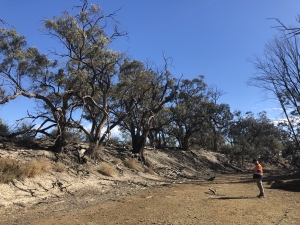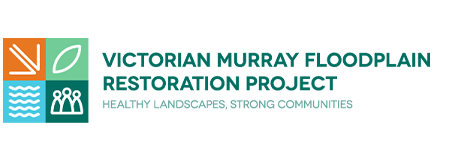23 September 2021
Latest news
EES/ER technical studies under way across all VMFRP sites
Our technical specialists are currently busy assessing the benefits and potential impacts associated with construction and operation of the planned VMFRP works. These technical studies give us critical information to ensure we maximise all benefits and appropriately manage any risks.
This information will be documented and will support our findings in preparation for the EES/ER public exhibition that will take place in mid-2022. Find out how you can get involved. If you have feedback or would like input into any of our technical studies, email the project team at info@vmfrp.vic.gov.au and we’ll put you in touch with the right person.
Current fieldwork
Several of these studies involve collecting data and information from each of the floodplains. We have a significant work program planned over the coming months. You can see more detail by viewing our planned fieldwork schedule here.
Ecology studies
Our ecologists are focused on national and state-listed threatened ecological values. Over the coming months, we will be undertaking fieldwork focussed on:
-

Here, specialists are looking at potential impacts on deep-rooted vegetation communities at Wallpolla Island (Photo: Zoe Jellie, GHD)
mapping and assessing the condition of vegetation across the floodplains
- assessing whether native vegetation and habitat may be impacted by groundwater changes
- where works are planned, identifying large canopy trees and their root protection zones
- targeted terrestrial fauna surveys for key species
- targeted aquatic fauna surveys, including electrofishing and fyke-netting, as well as identifying important habitat for fish, platypus, turtles, and crayfish
- targeted flora surveys for listed species and communities.
Geology, soils and contamination studies
Our geologists are focused on understanding the potential effects of land stability and geomorphic values and the potential effects of acid sulphate soils, contaminated sediments, or contaminated groundwater.
Over the coming months, bore water sampling will take place at existing groundwater bores of interest in or next to project sites. Site inspections will also target features of interest identified during the existing information review. Surveys will identify potential sources of groundwater contamination, either from background water quality, construction-related activities or potential sources identified during investigation and assessment works completed for the specialist assessment.
Cultural heritage
We are working with Traditional Owners to prepare Cultural Heritage Management Plans for each site. These plans assess the potential impact of projects on Aboriginal cultural heritage and outline ways to protect cultural heritage before, during and after construction.
Other studies
In addition to this important fieldwork, we have several technical specialists who are actively working to understand the potential effects of construction and operation of the VMFRP project across a wide range of matters. You can find out more about the matters being studied by reading the scoping requirements, available in the VMFRP Library.




